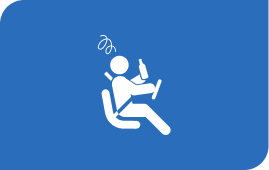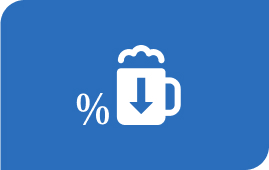Potential Alcohol Effects
Consuming alcohol is an individual choice and affects different people in different ways. Some studies have indicated that there may be a relationship between alcohol consumption and an increased risk of developing certain health issues. Heavy drinking on a regular basis has been connected to multiple illnesses, including liver disease, cardiovascular disease, dependency, and a heightened risk of certain types of cancer. 'Binge' drinking, which involves consuming large amounts of alcohol in a short period of time, is dangerous and can result in serious health issues. For some people moderate alcohol consumption may increase certain health risks and risks of certain types of cancer, such as breast cancer. In addition to pace, other factors that may influence the level of risk include amount and frequency of consumption, age, gender, genetics, and lifestyle. To that end, you should consult with your health care provider or medical professional to help you understand whether moderate drinking is compatible with your personal health circumstances.
Processing of alcohol in the human body

Medical professionals are best placed to provide guidance on your alcohol consumption. They can advise you throughout your adult life on how your current drinking patterns may impact your health, taking into account the latest medical research, your overall health status, your personal and family medical histories, and your environment, among other factors.
Below is a non-exhaustive list of links to guidelines on drinking and health promulgated by the governments of many countries. HEINEKEN does not endorse nor is responsible for the content of external links. This abbreviated list does not represent all available government resources on the subjects addressed, so please visit the applicable government resources in your country if you do not see your country’s governmental resources below.
Among other sources on this topic, the World Health Organization and the International Alliance for Responsible Drinking have issued a variety of reports about alcohol and health:
For a more complete list of drinking guidelines, please visit the following websites:
Summary of various nations’ guidelines for the general population
www.iard.org/science-resources/detail/Drinking-Guidelines-General-Popula...
Summary of various nations’ guidelines for pregnancy and breastfeeding
www.iard.org/science-resources/detail/Drinking-Guidelines-for-Pregnancy-...

When you drive never drink

Pregnancy

Legal Drinking Age

Low. Slow. No.
Excessive alcohol consumption (such as binge drinking) can be particularly dangerous and lead to serious harm. The information provided on this website has been collected by HEINEKEN and is for informational purposes only and should not be relied upon for any medical purposes. We make no representation that the information is complete. Please consult your health care provider or medical professional for additional information and/or to discuss your personal health circumstances.
The information provided on this website has been collated by HEINEKEN and is for informational purposes only and should not be relied upon for any medical purposes. We make no representation that the information is complete. Please consult your health care provider or medical professional for additional information and/or to discuss your personal health circumstances.




